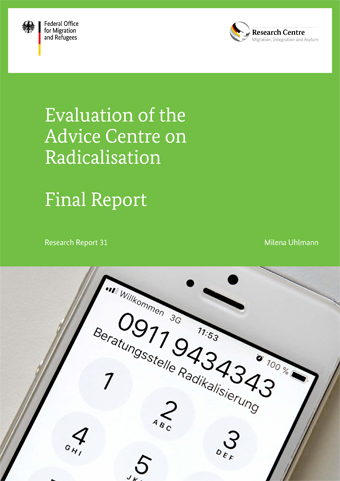Evaluation of the Advice Centre on Radicalisation , , Final report
 "Evaluation of the Advice Centre on Radicalisation" - Final Report
"Evaluation of the Advice Centre on Radicalisation" - Final Report
From April 2016 to August 2017, the research centre of the Federal Office for Migration and Refugees evaluated the advisory services for persons from the social environment of (potentially) radicalising persons offered by the BAMF Advice Centre on Radicalisation and its four local civil society partners, which were funded by the Federal Government at that time.
The evaluation focused on the counselling provided e.g. for family members and the social environment of (potentially) radicalised persons by the Advice Centre and its civil society partners. Furthermore, it analysed the cooperation among these actors as well as with other cooperation partners within the broader network during the first five years of the Advice Centre’s existence (1 January 2012 to 31 December 2016).
Key findings
- The number of requests for advice received by the Advice Centre (3,163 from 1 January 2012 to 31 December 2016) is continually rising, as is the number of cases passed on for further counselling from the Advice Centre to its civil society partners (854 over the same period).
- The counselling processes follow reasonable steps after receiving a request for advice at the Advice Centre to the closing of a case by a civil society partner. They are based on a precise logic of action and impact as well as on short- and long-term objectives tailored to each individual case.
- The field of work is undergoing a process of increasing professionalisation. This has a positive impact on defining precise fields of action and responsibilities within the network.
- The Advice Centre on Radicalisation holds a central position between relevant governmental and civil society stakeholders both at a federal and regional level. It thus provides important impulses and initiates processes on how to tackle challenges faced by the whole network, serving as an important information and coordination hub.
The Advice Centre’s pivotal function in the German deradicalisation network goes beyond its initial analysis of advice requests and its case referral to civil society partners: the Advice Centre serves as the indispensable basis for horizontal and vertical coordination, networking, communication, knowledge transfer and capacity building throughout the German-wide network.
The evaluation report discusses key terms such as "radicalisation", "deradicalisation" and "standard" and examines concepts of "best practice" and "success". Additionally, the report introduces a standard systematisation developed in the course of the evaluation, thereby establishing the foundation for a comprehensive impact analysis.
The evaluation report is available in German and English.
Author of the research report: Milena Uhlmann
